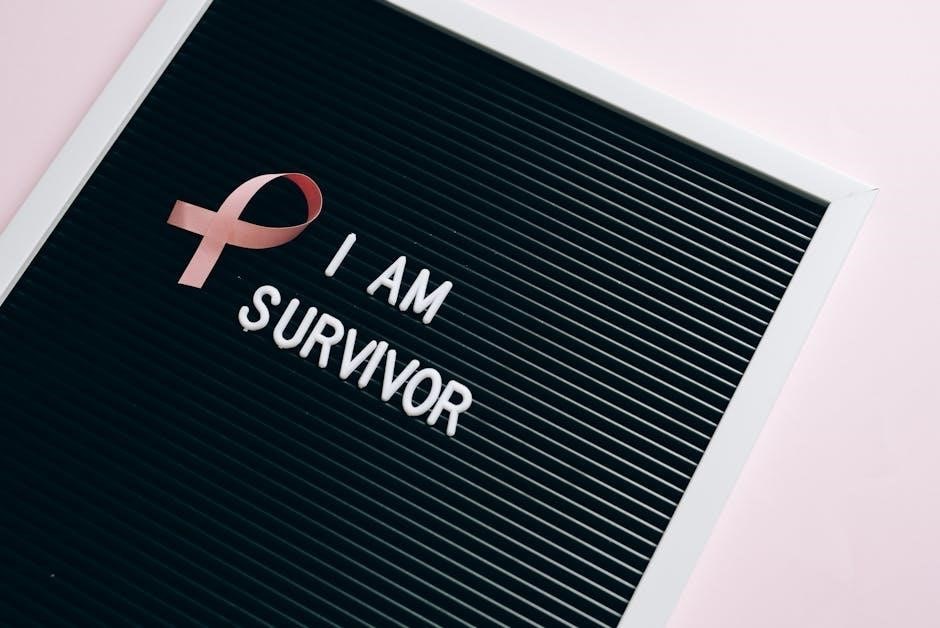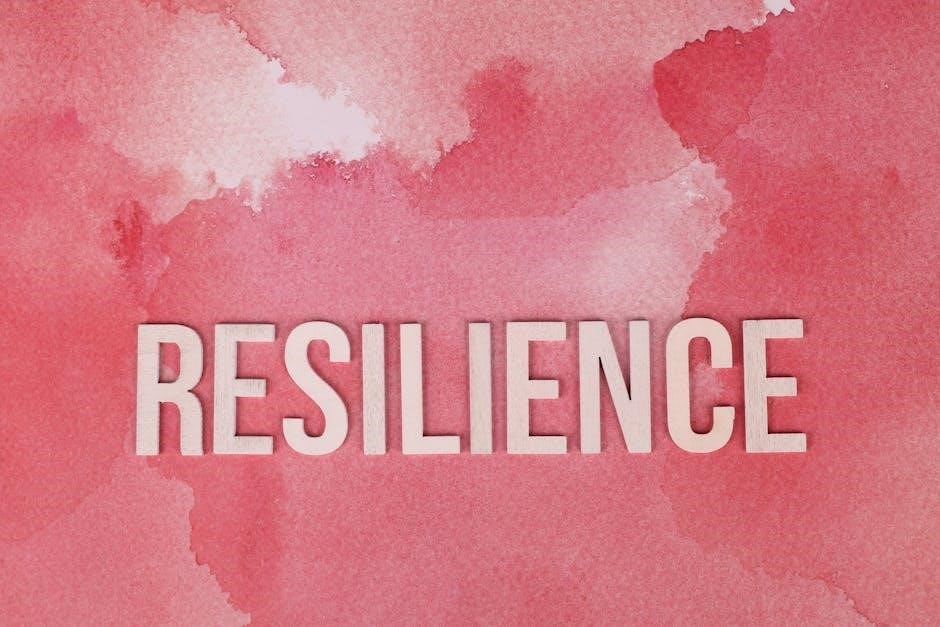Shame and self-hatred are profound emotional responses that can deeply impact mental health and personal growth․ Addressing these feelings is crucial for fostering resilience and healthy relationships․
Defining Shame and Self-Hatred
Shame is a painful emotion arising from feelings of guilt, regret, or inadequacy, often linked to perceived wrongdoings or shortcomings․ It can manifest as self-blame or a belief that one is fundamentally flawed․ Self-hatred, on the other hand, is an intense, persistent dislike or contempt for oneself, often rooted in internalized shame or past traumas․ While shame is typically situation-specific, self-hatred is a broader, more deeply ingrained negative self-view․ Both emotions can lead to self-criticism, low self-esteem, and difficulty in forming healthy relationships․ Understanding these concepts is essential for addressing their impact and fostering healing․

The Importance of Addressing Shame and Self-Hatred
Addressing shame and self-hatred is vital for emotional and mental well-being․ These emotions can hinder personal growth, damage relationships, and exacerbate mental health conditions like depression and anxiety․ Ignoring or suppressing these feelings often intensifies their negative impact, perpetuating a cycle of self-criticism and isolation․ By confronting and understanding their origins, individuals can begin to heal and develop a more compassionate relationship with themselves․ This process fosters resilience, improves self-esteem, and enhances overall quality of life; Recognizing the importance of addressing these emotions is the first step toward liberation from their oppressive effects․

Understanding the Root Causes
Childhood trauma, societal pressures, and negative life experiences are primary sources of shame and self-hatred, shaping self-perceptions and emotional well-being․ Understanding these origins is key to healing․
Childhood Trauma and Its Impact
Childhood trauma, including abuse, neglect, or inconsistent caregiving, profoundly shapes feelings of shame and self-hatred․ These experiences often lead to internalized negative beliefs about oneself, fostering a deep sense of unworthiness․ Traumatic events can make individuals feel responsible for circumstances beyond their control, creating a distorted self-image․ Over time, this can manifest as self-hatred and difficulty in forming healthy relationships․ The emotional wounds of childhood can persist into adulthood, influencing self-esteem and mental health․ Addressing these roots is essential for healing, as unprocessed trauma continues to fuel shame and self-criticism․ Recognizing the link between early experiences and adult struggles is the first step toward breaking the cycle of self-hatred․
Societal Expectations and Their Role
Societal expectations play a significant role in fostering shame and self-hatred by imposing unrealistic standards of behavior, appearance, and achievement․ Cultural norms, media representation, and societal pressures often create unattainable ideals, leading individuals to feel inadequate when they fail to meet these expectations․ For example, societal beauty standards or career success benchmarks can leave people feeling flawed or unworthy․ These external pressures are internalized, reinforcing negative self-perceptions and self-criticism․ Additionally, societal stigma around mental health, relationships, or lifestyle choices exacerbates feelings of shame․ Recognizing how societal expectations contribute to self-hatred is crucial for breaking free from their harmful influence and embracing authenticity․ Understanding these dynamics empowers individuals to challenge and reframe societal norms․
Past Mistakes and Their Influence
Past mistakes often serve as a fertile ground for shame and self-hatred, as individuals tend to dwell on errors or perceived failures․ These experiences can become deeply internalized, leading to self-blame and a distorted view of oneself as flawed or unworthy․ The weight of past mistakes can intensify feelings of shame, especially when coupled with self-criticism or a fear of judgment from others․ Over time, this can erode self-confidence and hinder personal growth․ However, it’s important to recognize that mistakes are a natural part of life and learning․ By practicing self-compassion and reframing past errors as opportunities for growth, individuals can begin to release the burden of shame and foster a more forgiving relationship with themselves․
Mental Health Conditions
Mental health conditions such as depression, anxiety, and borderline personality disorder often manifest with shame and self-hatred as core symptoms․ These conditions can amplify feelings of worthlessness and self-loathing, creating a cycle that reinforces negative self-perceptions․ For instance, individuals with depression may experience intense self-criticism, while those with anxiety might struggle with feelings of inadequacy․ Personality disorders, such as borderline personality disorder, often involve deep-seated shame tied to fears of abandonment and unstable self-images․ Shame can also act as a barrier to seeking help, as individuals may feel unworthy of healing or support․ Addressing these mental health conditions requires professional guidance and a compassionate approach to unravel the entanglement of shame and self-hatred, fostering a pathway toward recovery and self-acceptance․

Recognizing the Signs and Symptoms
Shame and self-hatred often manifest as negative self-talk, self-blame, or avoidance of social interactions․ Emotional symptoms may include feelings of worthlessness, anxiety, or persistent sadness․
- Negative self-talk and self-criticism
- Difficulty accepting compliments or praise
- Avoiding social situations due to feelings of inadequacy
- Physical symptoms like tension or avoidance behaviors
Internalized Shame
Internalized shame is a deeply rooted belief that one is inherently flawed, unworthy, or unlovable․ It often arises from repeated experiences of criticism, rejection, or abuse, leading to self-blame and self-rejection․ This emotional state can manifest as self-criticism, difficulty accepting praise, or a tendency to hide one’s true self․ Over time, internalized shame can erode self-esteem, fostering feelings of inadequacy and low self-worth․ It may also lead to self-destructive behaviors or avoidance of intimate relationships due to fear of judgment․ Recognizing internalized shame is crucial, as it often lies at the core of self-hatred and can significantly hinder personal growth and emotional healing․ Addressing it requires self-compassion and a willingness to challenge deeply ingrained negative beliefs․
Self-Hatred as a Sign of Pain
Self-hatred often emerges as a response to unresolved emotional pain, serving as a manifestation of deeper wounds․ It arises when individuals internalize criticism, failures, or traumatic experiences, leading to a distorted self-perception․ This mindset perpetuates a cycle of self-punishment, reinforcing feelings of worthlessness․ Self-hatred can also act as a defense mechanism, masking vulnerabilities and preventing further hurt․ However, it ultimately exacerbates suffering by alienating individuals from their true selves and others․ Recognizing self-hatred as a symptom of underlying pain is vital, as it highlights the need for compassion and healing․ Addressing the root causes, rather than the symptoms, is essential for breaking free from this harmful pattern and fostering self-acceptance․

Psychological Impact
Shame and self-hatred profoundly affect mental well-being, influencing emotions, thoughts, and behaviors to varying degrees of severity, often undermining overall psychological health and resilience․
Effect on Self-Esteem
Shame and self-hatred significantly erode self-esteem, fostering negative self-perceptions and a lack of self-worth․ They create a cycle of self-criticism, where individuals view themselves as flawed or unworthy, hindering their ability to acknowledge strengths or achievements․ This distortion often leads to self-doubt, making it difficult to pursue personal goals or form healthy relationships․ Over time, the internalized negativity can become so ingrained that it feels impossible to escape, further diminishing confidence and self-respect․ Recognizing this pattern is crucial, as it allows individuals to begin challenging these harmful beliefs and work toward rebuilding a more compassionate and realistic self-image․
Influence on Mental Health
Shame and self-hatred profoundly impact mental health, often contributing to conditions like depression, anxiety, and low self-esteem․ These emotions can intensify feelings of isolation, making individuals withdraw from social interactions and supportive relationships․ Chronic self-hatred may lead to self-destructive behaviors, such as substance abuse or self-sabotage, as a way to cope with inner pain․ Additionally, shame can exacerbate mental health disorders by creating a cycle of negativity and self-blame, which can be difficult to break without intervention․ Addressing these feelings is crucial for healing and preventing further mental health deterioration․ Recognizing their influence is the first step toward seeking help and fostering emotional well-being․
Impact on Social Relationships
Shame and self-hatred can significantly strain social relationships, as individuals may struggle to connect authentically with others․ Feelings of unworthiness often lead to isolation, causing people to withdraw from loved ones or fear rejection․ This emotional distance can make it difficult to form and maintain intimate relationships․ Shame may also manifest as defensiveness or people-pleasing behaviors, creating tension and resentment․ Trust issues may arise, as individuals with deep-seated shame may fear being judged or exposed․ Over time, these patterns can lead to feelings of loneliness and disconnection, reinforcing the cycle of self-hatred․ Healing these relational wounds is essential for building healthier, more fulfilling connections with others․

Strategies for Overcoming Shame and Self-Hatred
Effective strategies include practicing self-compassion, challenging negative self-talk, and engaging in mindfulness․ These approaches help individuals reframe harmful beliefs and cultivate a more positive self-image․
Practicing Self-Compassion
Practicing self-compassion is a powerful way to counteract shame and self-hatred․ It involves treating yourself with kindness, understanding, and patience, especially when faced with imperfections or mistakes․ Start by acknowledging your emotions without judgment, and remind yourself that everyone experiences struggles․ Speak to yourself in a gentle, supportive manner, as you would to a close friend․ Engage in activities that bring you comfort and joy, and prioritize self-care․ Self-compassion helps to replace self-criticism with acceptance, fostering a healthier relationship with yourself․ Over time, this practice can diminish the grip of shame and build resilience against self-hatred․
- Acknowledge your emotions without judgment․
- Use kind and supportive self-talk․
- Engage in comforting and joyful activities․
Mindfulness and Meditation
Mindfulness and meditation are effective tools for overcoming shame and self-hatred by fostering self-awareness and acceptance․ These practices help you stay present, reducing the impact of painful memories or self-critical thoughts․ Through meditation, you can observe emotions without judgment, creating space for compassion․ Techniques like mindful breathing or loving-kindness meditation encourage kindness toward yourself, diminishing self-hatred․ Regular practice strengthens emotional resilience, allowing you to approach challenges with greater calm and clarity․
- Practice mindful breathing to stay present․
- Use loving-kindness meditation for self-acceptance․
- Observe emotions without judgment․
Challenging Negative Thought Patterns
Challenging negative thought patterns is crucial for overcoming shame and self-hatred․ Often, these emotions stem from deeply ingrained, harmful beliefs about oneself․ Cognitive-behavioral techniques can help identify and question these beliefs, replacing them with more balanced and compassionate perspectives․ For example, when a negative thought arises, ask yourself if it is based on facts or emotions․ This process helps break the cycle of self-criticism and fosters a more realistic self-view․ Over time, practicing this skill can reduce the intensity of shame and promote emotional healing․
- Identify harmful beliefs about yourself․
- Question the validity of negative thoughts․
- Replace self-criticism with compassionate statements․

Seeking Support
Seeking support is vital for healing from shame and self-hatred․ Professional guidance, support groups, and trusted loved ones provide a safe space to process emotions and rebuild confidence․
Key elements:
– Professional therapy for structured guidance․
– Support groups for shared experiences and connection․
– Trusted relationships for emotional safety and understanding․
The Role of Therapy
Therapy plays a crucial role in addressing shame and self-hatred by providing a safe, non-judgmental space to explore deeply rooted emotions․ Trained therapists can help individuals identify patterns of negative self-talk and beliefs that perpetuate shame; Through evidence-based approaches like cognitive-behavioral therapy (CBT) or psychodynamic therapy, individuals can reframe harmful narratives and develop a more compassionate relationship with themselves․ Therapy also equips individuals with tools to manage triggers and build resilience․ By understanding the origins of shame and self-hatred, therapy fosters self-awareness and promotes healing․ It empowers individuals to reconnect with their authentic selves and move toward a more fulfilling life․
Key benefits:
– Professional guidance tailored to individual needs․
– Evidence-based techniques to address root causes․
– A supportive environment for emotional exploration and growth․
Importance of Support Groups
Support groups provide a safe space for individuals to share their experiences and connect with others facing similar challenges․ These groups foster a sense of community and reduce feelings of isolation, which are often intensified by shame and self-hatred․ By hearing others’ stories, individuals can gain validation and realize they are not alone in their struggles․ Support groups also offer mutual encouragement and accountability, helping participants stay motivated on their healing journey․ They provide a platform to learn coping strategies and gain new perspectives, empowering individuals to approach their challenges with greater confidence and resilience․
Key benefits:
– Shared understanding and connection with others․
– Mutual support and encouragement․
– Learning practical strategies for healing․
Opening Up to Trusted Loved Ones
Confiding in trusted loved ones can be a powerful step in healing from shame and self-hatred․ Sharing your feelings with someone who cares deeply about you can help alleviate feelings of isolation and provide emotional support․ It’s important to choose someone who is empathetic, non-judgmental, and able to listen without offering unsolicited advice․ Opening up can foster intimacy and strengthen relationships, while also helping you process difficult emotions․ Be patient with yourself and take it one step at a time, sharing as much as feels comfortable․ Remember, vulnerability is a sign of courage, not weakness․
Key benefits:
– Reduces feelings of isolation․
– Provides emotional validation and support․
– Strengthens relationships through vulnerability․

Healing and Recovery
Healing from shame and self-hatred is a gradual journey requiring patience, self-compassion, and a willingness to confront deep-seated emotions․ Understanding the root causes of these feelings is crucial for lasting change․ Recovery involves rebuilding self-worth, embracing personal growth, and fostering a positive relationship with oneself․ It’s a process of transformation, where pain becomes an opportunity for resilience and empowerment․
Key aspects:
– Gradual and intentional progress․
– Self-compassion and understanding․
– Transforming pain into strength․
Letting Go of Shame
Letting go of shame involves acknowledging its presence and understanding its origins․ Shame often stems from unresolved past experiences, negative self-perceptions, or societal judgments․ To release it, one must confront these feelings with compassion rather than criticism․ Redefining one’s identity outside of shame is essential, allowing for a healthier self-view․ This process requires patience and self-kindness, as shame can deeply embed itself in one’s psyche․ Acceptance of past mistakes as learning opportunities, rather than sources of perpetual guilt, fosters healing․ Ultimately, letting go of shame liberates individuals from its suffocating grip, enabling them to embrace their true selves and live more authentically․
Key steps:
– Acknowledge and accept shame without judgment․
– Challenge and reframe negative self-perceptions․
– Embrace self-compassion and forgiveness․
– Seek support and create a growth-oriented mindset․
Rebuilding Self-Worth
Rebuilding self-worth is a transformative process that involves fostering a positive and compassionate relationship with oneself․ It begins with acknowledging one’s intrinsic value and challenging negative self-perceptions rooted in shame or self-hatred․ Small, achievable goals can help restore confidence and create a sense of accomplishment․ Practicing self-affirmations, such as recognizing personal strengths and qualities, reinforces self-respect․ Surrounding oneself with supportive individuals who encourage growth also plays a vital role․ Engaging in self-care activities that promote physical and emotional well-being further nurtures self-worth․ Over time, these efforts cultivate resilience, helping individuals develop a healthier, more compassionate self-image that supports long-term healing and personal growth․
Key elements:
– Focus on personal strengths and qualities․
– Set and achieve small, meaningful goals․
– Surround yourself with supportive relationships․
– Practice consistent self-care and self-compassion․

Maintaining Progress
Maintaining progress involves consistent self-care, mindfulness, and setting healthy boundaries․ Regularly tracking achievements and seeking support ensures sustained growth and prevents setbacks in the healing journey․
Key strategies:
– Prioritize daily self-care routines․
– Stay mindful of thoughts and emotions․
– Set and maintain healthy boundaries․
– Regularly reflect on progress and goals․
Engaging in Self-Care

Engaging in self-care is a powerful way to maintain progress in overcoming shame and self-hatred․ Self-care involves intentional acts of kindness, compassion, and nurturing toward oneself․ Activities such as mindfulness, exercise, creative expression, and relaxation help counteract negative self-perceptions․ By prioritizing self-care, individuals can create a foundation of emotional resilience, reducing the impact of shame and fostering self-compassion․ Consistency is key, as regular self-care practices reinforce positive self-regard and support the healing process․ Self-care is not a luxury but a vital tool for rebuilding self-worth and moving beyond the grip of shame and self-hatred․
Setting Healthy Boundaries
Setting healthy boundaries is essential for maintaining emotional well-being and overcoming shame and self-hatred․ Boundaries protect your mental and emotional space, preventing toxic influences that may exacerbate negative self-perceptions․ Learning to say “no” without guilt and asserting your needs clearly fosters self-respect․ Healthy boundaries involve communicating your limits assertively while respecting others’․ Consistency is key to avoiding confusion and mixed signals․ By establishing boundaries, you create a safe environment to heal and grow, reducing the risk of situations that trigger shame or self-hatred․ Surrounding yourself with people who respect these boundaries further supports your journey toward self-worth and emotional freedom․
Overcoming shame and self-hatred is a challenging yet attainable journey․ Healing requires resilience, self-compassion, and hope․ Remember, you are deserving of love, growth, and peace․
Summarizing Key Points
Shame and self-hatred often stem from childhood trauma, societal expectations, or past mistakes, deeply impacting mental health and relationships․ Recognizing signs like internalized shame or self-criticism is crucial for healing․ Strategies such as self-compassion, mindfulness, and challenging negative thoughts can help overcome these emotions․ Seeking support through therapy or support groups, along with opening up to loved ones, accelerates recovery․ Healing involves letting go of shame and rebuilding self-worth, while maintaining progress requires self-care and healthy boundaries․ Remember, overcoming shame is a journey of resilience and growth, and seeking help is a sign of strength, not weakness․ With patience and support, profound healing and self-love are achievable․
Encouragement for the Journey Ahead
Overcoming shame and self-hatred is a courageous and transformative journey․ It’s important to embrace patience and self-compassion as you navigate this path․ Celebrate small victories and acknowledge your strength for facing these emotions head-on․ Healing is not linear, and setbacks are part of the process, but growth is possible with persistence․ Surround yourself with supportive loved ones and seek professional guidance when needed․ Remember, you are deserving of love, kindness, and forgiveness—most importantly from yourself․ Every step forward is a testament to your resilience․ Trust the process, and believe in your ability to heal and embrace a brighter, more compassionate future․ You are not alone, and your journey is worth it․
